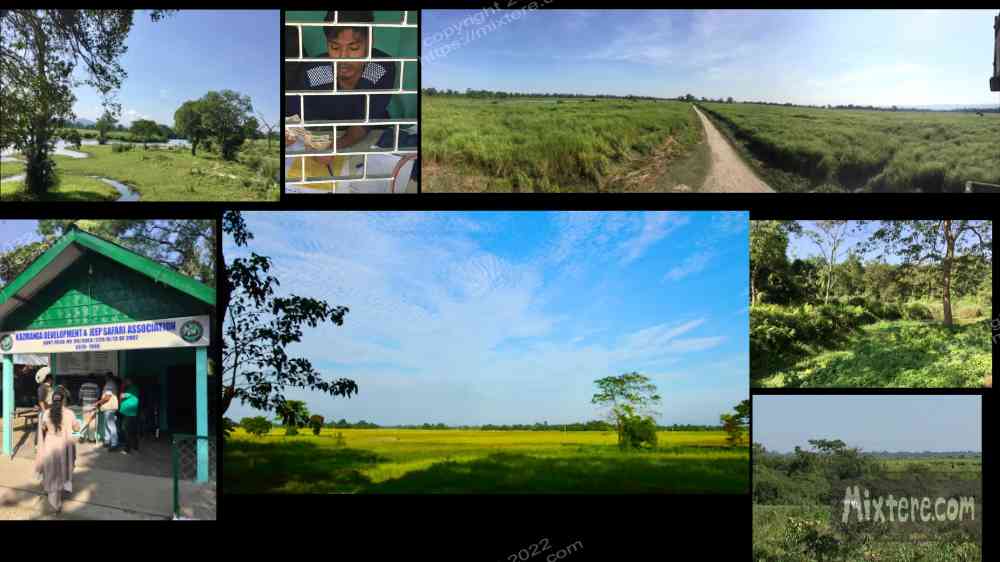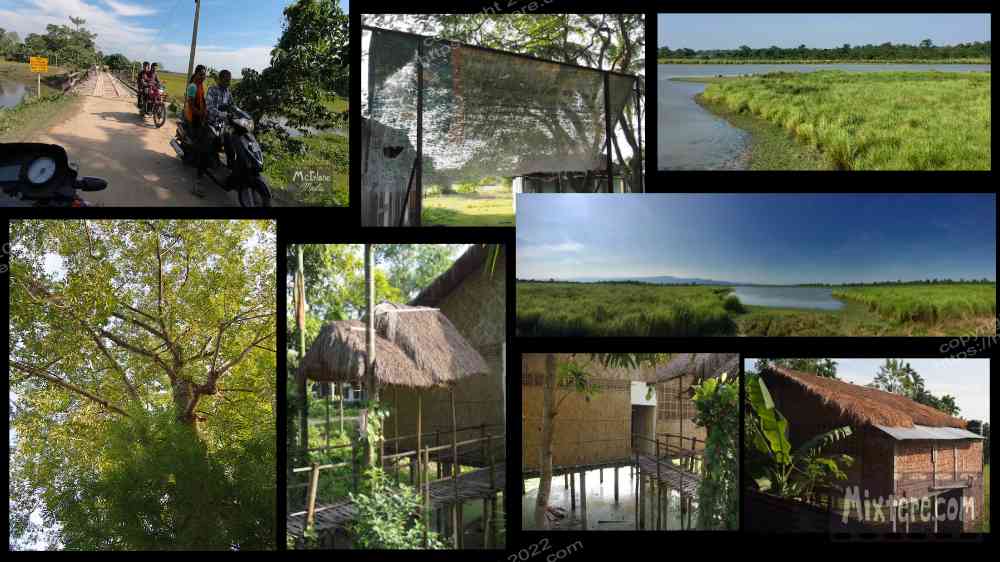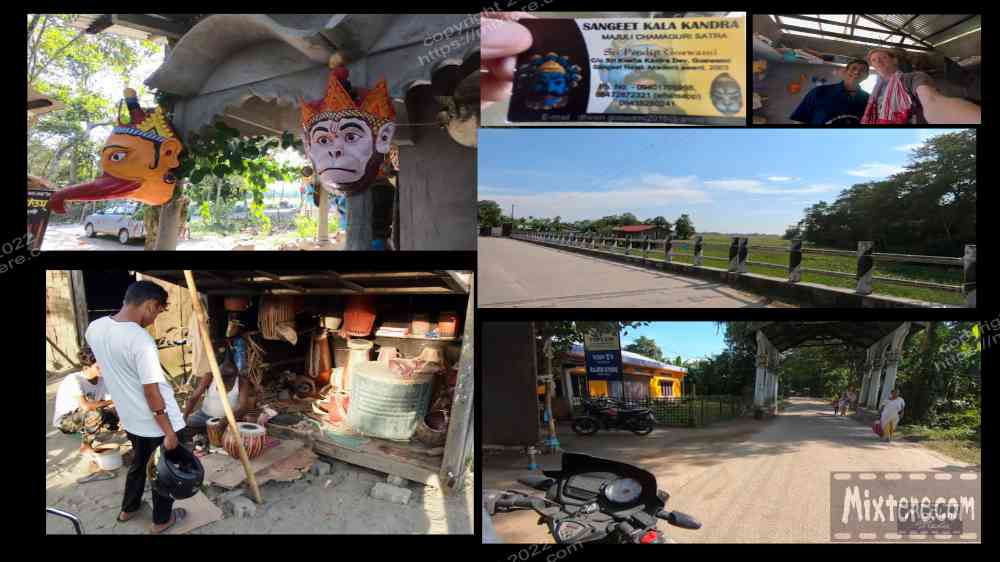
On the following day I embarked on a tightly-scheduled itinerary that is exactly how I don’t like to travel. That is, in a hurry, anxious not to miss the “must see” sights.” On this occasion my budget and schedule and stubbornness seemed to require this approach. I would not have forgiven myself if I missed seeing Kaziranga National Park or Majuli river island. It was not likely that I would find myself in Assam, perhaps ever again. But I sensed the National Park to be a tourist trap and did not wish to linger there. I would immediately "shift," as Indians say, on to a ferry to Majuli. Some refer to it as a peninsula, others as the second largest island in the world. Based on what Biswajit said I sensed that it was special. Plus I had never heard of it and that sealed the deal. So I headed off for the park and then to Majuli. There was a big festival/ puja featuring the island's traditional devotional theatre performances to happen there the following week. Therefore accommodation was to be scarce. I hoped to pop in and see what I could of the place before things got too busy.
A note about big events- all my life the majority of people around me have been oriented to going where the crowd is. As a young man this meant the parties, the concerts, going where it was “happening.” But by my late twenties I learned that seeking crowds and happening places led to headaches and almost always anticlimactic disappointment. I can’t tell you how many New Years Eve’s have resulted in disappointment and doldrums, no matter how much effort I made to go where it was happening. Each and every New Years resulted in the countdown to the new year and then… nothing. Nothing but Dick Clark, that stupid ball and “Rockin’ New Years Eve.” Midnight would hit, fireworks would happen and then the crowd usually cleared out within ten minutes to crawl home with the traffic ripe with cops and drunk drivers. “Happy new year! [pause] Where are we parked?” Anyway, when traveling India, due to the intensity of most places I did my best to minimize crowds, stress and additional costs by simply not being “where it is happening.” My hope for Majuli was no different.
From Tezpur I boarded an Assam state bus where the locals politely tolerated me. Fruits of the fertile soils and basic bamboo homes passed. The bus bobbed to a soothing rhythm through the countryside. Moist breezes scented with plants and tropical dirt wafted in through the open windows. The bus passed right by Kaziranga National Park and I got off there. I began to walk the road to the National Park through the middle of a tea plantation. The tea plants were a canopy of verdant green cropped low and at the same level to facilitate harvest (it seems). I noticed that harvest often involves people maneuvering a convoluted contraption that rides the top of the canopy and sheers the leaves off. Walking the tea plantation was like walking a flat-topped forest whose trees you could see high above. It was beautiful but not exactly natural. Soon I arrived at an official looking compound.

Although I didn’t want to miss the chance at seeing the Indian rhinoceros, upon arriving I immediately sensed that I was at a hefty stop on the tourist circuit and was about to be fleeced. I feel that I was asked for way too much money for the entry and for the jeep ride through the park. It was probably about thirty dollars. Being unaccustomed to “attraction” costs and the well worm tourist path, the change dug into me more sharply than it would your average tourist. After scoffing at the fee I relented and paid. I was paired with about four other visitors, husband and wife groups. We were all stuffed into an open jeep. Then we were off bumping along the dirt track that skirted wetlands. Mostly there were these large horned water buffalo with birds perched on them. In the far distance we could view a few rhinos. My phone's camera could not even bring them into focus. Mostly there was swamp and lots of birds as well as open grassland. A man aboard the jeep shared with me that while tigers might be around, the chance of seeing on was very small. He told me how after one hundred safari’s, he had finally caught a fleeting glimpse of a tiger in the interior of the subcontinent a while back. He insisted that such a glimpse was not to be expected. I noted the fact and secretly cheered the tiger’s intelligence and luck in keeping a distance from the meddling humans.
Soon, without much exciting ever having happened, the tour was over. By 11 AM I was walking with my gear back through the tea plantation to the highway, brushing off people's attempt to sell me a ride back to the road. Soon I caught the bus and was headed for Jorhat and then to a ferry to Majuli. I was suddenly in the strange city of Jorhat. I walked the streets with all my gear to the shared taxi area to get the to the ferry; about 20 minutes away. I ended up finding one of those small Asian ultra-micro busses which to my dismay continued to take on passengers far past its official capacity. I think I counted fourteen of us squashed into that little van, which at the time felt to be a new record. We somehow got to the ferry area early. Having missed lunch as well as breakfast, I bought and then ate a lot of potato chips while I waited. I learned last-minute that I had been sitting in the waiting area (which resembled a ferry) and not the actual ferry. On my diet of potato chips I did not exactly have my wits about me and was exhausted from the pace that I was traveling at. These sort of situations are common. Sometimes being a solo traveler means discovery and sometimes it means reinventing the wheel. But almost always it means infrequent food and acting the fool. As a traveler you are simultaneously honored guest and visiting fool. But the differences in culture that make travel so rewarding cannot be separated from this. Cultural differences are perceived as goofy or downright strange. Sometimes when you are on the stage as a visiting foreigner, it helps to embrace a few yuks along the way.
The ferry was packed and I had to use my backpacks as a seat. To help the time pass I pulled out the ipad and did some video editing as we slowly crossed over to Majuli. Plopped in the middle of the packed ferry, it was far too late to achieve any low profile. I figured I may as well edit some video editing done. Eyes from all around landed upon me and the mysterious contraption in my hands. Once we landed I took a shared van to the nearby town. I called a contact and just as it was getting dark he picked me up. He took me to his modest bamboo hut guesthouse. I lived in that bamboo shack over a swamp at an un-cheap price for about four days. It was really rustic but a nice time.

Majuli felt relaxing. Perhaps this was the island effect slowing things down. There was a feel about Majuli was not that different from a beach town. People didn’t move or speak too quickly. The weather was warm, the sunshine bright, and the sky blue from the reflections off all the water. Many people wore shorts and flip flops as well, cementing for me Majuli's likeness to a beach town. The island is known for its community's’ dedication to a form of Hindu devotional performance art (or play). Apparently Majuli has been the hub of Assamese neo-Vaisnavite culture since the 1500’s. A specific form Hindu devotional plays focused around the hundreds of monasteries (Satras) on the island were what the following weeks’ focus would be on. My host offered to take me around the island on motorcycle tour and visit a master mask-maker who developed props and deities for these plays. Along with the master mask-makers and the general loveliness of the river island of Majuli, what was notable about my stay at Adito’s Bamboo Cottages was the food. Adito's mother provided home-cooked Assamese cuisine that featured [for me] exotic flavors that I had not experienced in India. Most notable of these was Pitika, a condiment served along with dinner composed of fish, burned banana leaves and some other stuff. It was served shaped into a ball and set alongside the main course. The flavor was rich and a little funky. Absent were the telltale spices of south or even northern India.
Adito's motorcycle tour was a great way to see the vast, lush, flat island. I filmed much of the ride and currently offer condensed versions of it via the youtube link below. In time I got it together and left the island of Majuli to head further northeast. Majuli holds a special spot in my heart. I wish the best for those nice people and hope to return some day.


